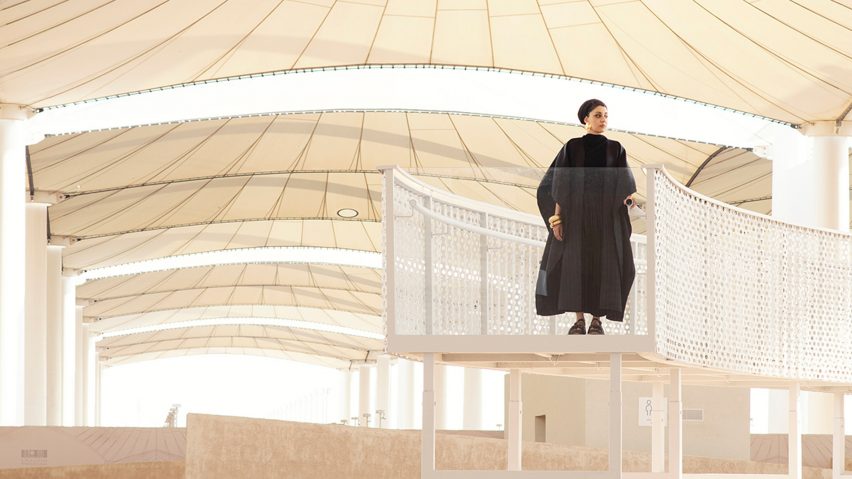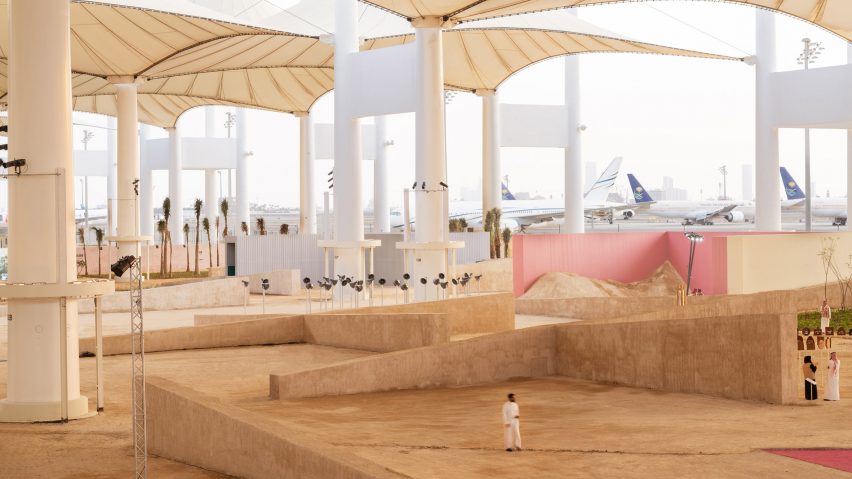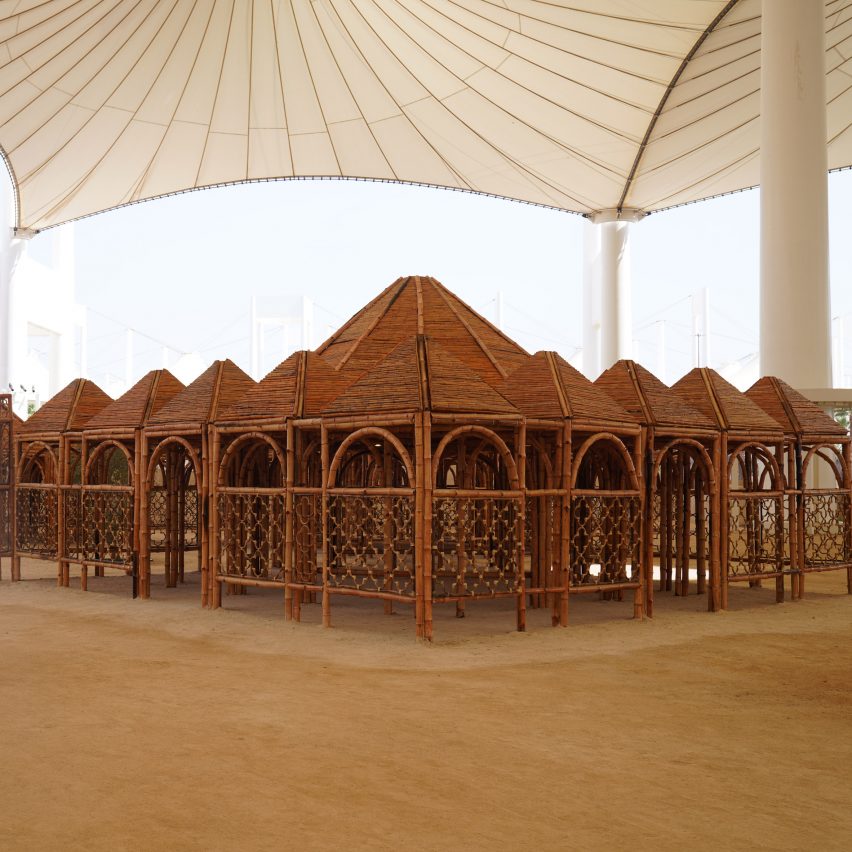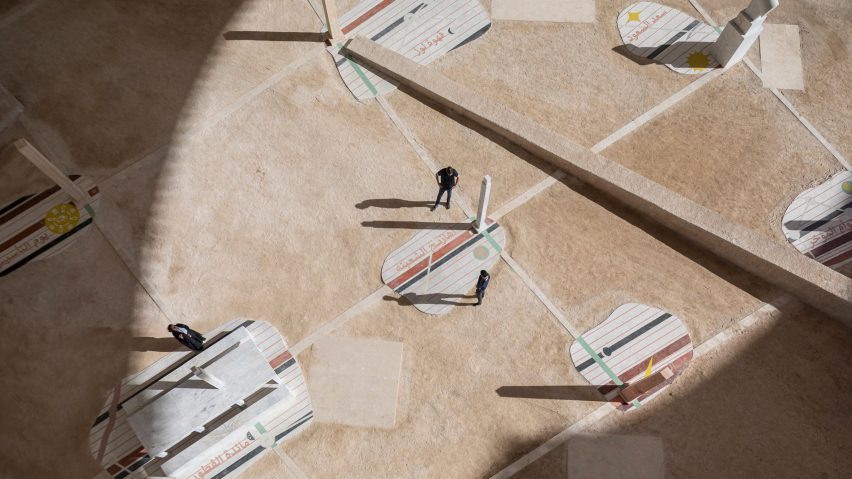
Islamic Arts Biennale "a historic moment for the entire Muslim world" says curator Sumayya Vally
Islamic Arts Biennale artistic director Sumayya Vally explains how the event in Saudi Arabia aims to build understanding about both Muslim art and the Muslim world in this exclusive interview.
Described by South African architect Vally as a "historic moment", the biennale is the the first to be dedicated to Islamic art.
"This is an Islamic biennale – a historic moment, not only for Saudi Arabia, but for the entire Muslim world, and for all of the parts of the world that Islam touches," Vally told Dezeen.
"This is an opportunity to bring forth different perspectives"
"For a long time, we have been waiting for a moment to represent ourselves from our perspectives, from our voices," she continued.
"To understand the Islamic Arts Biennale as a platform for making a contribution to the discourse and canon of Islamic arts has been profoundly personal and important to me. It is important that we acknowledge that Islamic faith, Islamic practice and Islamic tradition can and should be making a creative contribution to the world."
The biennale is taking place at the Western Hajj Terminal at Jeddah airport in Saudi Arabia at a time when some architecture studios have been criticised for working in the country.
Vally said she hopes that the biennale will act both as an event to reassess what Islamic art is, but also to open a discourse about Saudi Arabia and the wider Muslim world.

"Everywhere that one works is a negotiation," she said.
"This is an opportunity to bring forth different perspectives; for this platform to be a place for criticality and for it to expand, deepen, divert from, reclaim and imagine the definitions of Islamic arts that we have inherited from the West," she continued.
"I believe that platforms like this have a role to play in understanding the profound cultural and artistic heritages around us; and in nurturing and promoting understanding between communities."
"There is an incredible energy of transformation"
Although Saudi Arabia has been criticised internationally, Vally believes that rapid change is taking place in the country and that there is a growing focus on arts, culture and architecture.
"There is an incredible energy of transformation and a gravitational shift of axes for the world that is currently happening as we look to shape the future from different perspectives – this part of the world is a part of that shift," said Vally.
"Here is a population hungry for attention to their discourses around arts and culture. To be able to feel that energy is incredibly powerful."

Set within the Western Hajj Terminal at King Abdulaziz International Airport, which was designed by US studio Skidmore Owings & Merrill in the early 1980s, the biennale's scenography was designed by Dutch studio OMA.
Within the outdoor "desert-like landscape" and the more traditional indoor gallery spaces created for the biennale, Vally selected and commissioned a range of installations that aim to expand visitors' general understanding of Islamic art.
"Existing definitions of Islamic art often focus on style, tradition, geography, pattern, and geometry," she said.
"The ambition of the biennale is to build on and challenge these criteria, expanding on the existing canon of Islamic art, and to question the narrative, museological, and artistic practices of this time," she continued.
"Islamic artworks may have surface similarities, but what really unites them is inherent in how they are made, used, and understood."
Biennale "has the potential to shift and shape discourse"
The biennale contains a mix of historic works including the first door of the Kaaba – the building at the centre of Great Mosque of Mecca, and contemporary works.
Vally commissioned installations by numerous artists and architects – around half of which were from the Middle East – including Pakistani architect Yasmeen Lari, Jeddah-based Studio Bound and Kuwait-based Civil Architecture.
Each of the designers was tasked with interpreting the ideals of community, gathering and making home.
"It has been profound for me to have the opportunity to honour my background as a Muslim and the practices I grew up with; so many of which have been formative to my modes of practice – interests in the oral, aural, the ritual, the performed, the collective and the communal," explained Vally.
"The Islamic Arts Biennale draws on these themes, presenting experiences that surround these expressions and forms of belonging – reflecting on the role of rituals in creating connections and constructing belonging," she added.
She hopes that those visiting the biennale will gain a greater understanding of the Muslim world.
"To present these ways of being as a basis for understanding a place, but also more broadly understanding a huge part of the world that identifies as Muslim, has the potential to shift and shape discourse for the future, from these very voices – and that is profound," she said.
"As artistic director, I am honoured that this definition of Islamic art – rooted in the experiential, the sensory, the atmospheric – has manifested in this biennale."

"I hope that this definition can seed worlds that will continue to manifest identities which are reflective, and generative with philosophies and experiences of Islam that are resonant with the worlds so many of us have been raised in and inhabit," she continued.
Following global condemnation of Saudi Arabia's regime following the murder of journalist Jamal Khashoggi in 2018, foreign companies working in the country have come under criticism, including architecture studios working on the controversial Neom mega-project.
Saudi Arabia has been widely criticised for its human rights record and last year human rights organisation ALQST reported that three men forcibly evicted from the Neom site had been sentenced to death.
Speaking to Dezeen, Amnesty International's Peter Frankental said architecture studios are facing a "moral dilemma" and should "think twice" about their continuing involvement in the project.
The Islamic Arts Biennale takes place in Jeddah from 23 January until 23 April 2023. See Dezeen Events Guide for an up-to-date list of architecture and design events taking place around the world.